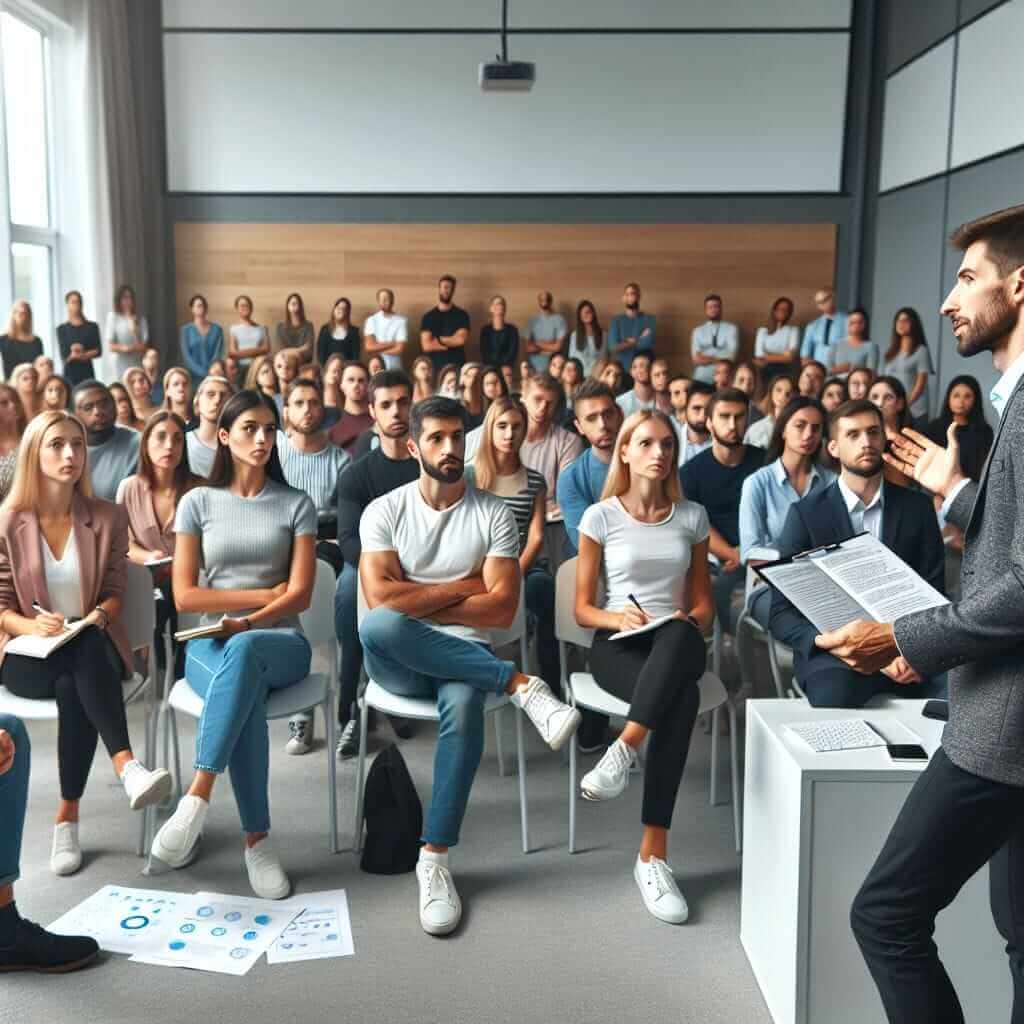In the IELTS Speaking test, examiners assess various aspects such as fluency and coherence, lexical resource, grammatical range and accuracy, and pronunciation. It’s essential to understand what examiners are looking for and how to provide answers that showcase your language skills effectively. Questions like “Describe a time when you attended a seminar” frequently appear in the IELTS Speaking Part 2, often leading to further discussion in Part 3. This article will guide you on how to tackle such questions with sample answers and tips to maximize your score.
Part 1: Introduction and Interview
In Part 1, the examiner will ask you general questions about yourself and familiar topics. These are some common questions:
- What do you do for a living?
- Do you enjoy your work?
- What do you do to relax?
- Have you attended any seminars recently?
Sample Answer for a Common Question
Question: Have you attended any seminars recently?
Answer: Yes, I recently attended a seminar on digital marketing. It was incredibly informative and gave me a lot of insights into the latest trends and techniques in the field. The seminar was organized by my company, and we had some renowned experts sharing their knowledge.
Part 2: Long Turn
In this part, you will be given a cue card with a topic and some bullet points to cover. You will have one minute to prepare and then speak for up to two minutes.
Cue Card
Describe a time when you attended a seminar. You should say:
- What the seminar was about
- Where the seminar was held
- Who attended the seminar
- Explain why you attended this seminar
Sample Answer
One memorable seminar I attended was on environmental sustainability. Held at the local community center, the seminar’s primary focus was on educating participants about sustainable living practices. The seminar was well-organized, featuring various speakers who were experts in environmental science and sustainability.
Interestingly, the audience was diverse, including students, environmental activists, and business owners. I attended this seminar because I have a keen interest in environmental issues and wanted to learn more about how I could contribute to a more sustainable future. Moreover, the speakers offered practical advice on how to reduce our carbon footprint, which I found extremely valuable. Overall, it was an enlightening experience, and I walked away with a greater understanding of sustainability practices.
Additional Questions and Answers
Question: What was the most interesting part of the seminar for you?
Answer: The most interesting part was the interactive session with a leading environmental scientist. She demonstrated some simple yet effective ways to incorporate sustainability into our daily lives, such as composting and using energy-efficient appliances. Her passion and practical advice were truly inspiring.
Part 3: Two-way Discussion
In this part, the examiner will ask further questions related to the topic in Part 2 but in a more abstract way. This is to assess your ability to discuss more complex ideas.
Discussion Questions and Sample Answers
Question: Why do you think attending seminars is important?
Answer: Attending seminars is crucial for both personal and professional development. They provide an excellent platform for networking, gaining new perspectives, and staying updated with the latest advancements in your field. Moreover, the interactive nature of seminars allows for the exchange of ideas, which can be incredibly enriching.
Question: How do companies benefit from sending their employees to seminars?
Answer: Companies can greatly benefit from sending their employees to seminars. First, it helps in the professional development of their staff, which can lead to increased productivity and innovation. Additionally, employees often come back with new insights and skills, which can be applied to improve workplace efficiency. Networking opportunities at seminars can also help companies establish new partnerships and business opportunities.
Question: Do you think online seminars are as effective as face-to-face ones?
Answer: While online seminars offer greater flexibility and accessibility, there are certain advantages to face-to-face seminars that cannot be replicated virtually. In-person interaction allows for more effective networking and a more engaging learning experience. However, online seminars can still be highly effective, especially when the content is well-organized and interactive elements are incorporated.
Vocabulary and Structures for High Scores
- Memorable /ˈmemərəbl/: Worth remembering or easily remembered
- Environmental sustainability /ɪnˌvaɪrənˈmentl səˌsteɪnəˈbɪləti/: Practices and development processes that do not harm the environment
- Footprint /ˈfʊtprɪnt/: The impact of a person or community on the environment
- Interactive /ˌɪntərˈæktɪv/: Involving communication between people
- Networking /ˈnetˌwɜːrkɪŋ/: Interacting with others to exchange information and develop professional or social contacts
Usage Examples
- Memorable: “Attending that conference was a memorable experience that significantly boosted my career.”
- Environmental sustainability: “The seminar highlighted the importance of environmental sustainability in modern urban planning.”
- Footprint: “We should all strive to reduce our carbon footprint.”
- Interactive: “The workshop was highly interactive, allowing participants to engage with the speakers.”
- Networking: “Seminars provide excellent opportunities for networking and learning from peers.”
Examiner Tips for High Scores
- Practice Regularly: Familiarize yourself with common topics and practice them regularly. Use varied vocabulary and complex sentences.
- Fluency and Coherence: Speak fluently and connect your ideas logically. Avoid long pauses.
- Pronunciation: Focus on clear and correct pronunciation. Stress and intonation make your speech more engaging.
- Use of Vocabulary: Ensure a wide range of vocabulary, including some topic-specific terms.
- Grammar Accuracy: Use a variety of grammatical structures accurately. Watch out for common mistakes.

By incorporating these strategies and examples, you can confidently tackle the “Describe a time when you attended a seminar” question in your IELTS Speaking test and increase your chances of achieving a high band score.
For further reading, you might find these articles helpful as well: